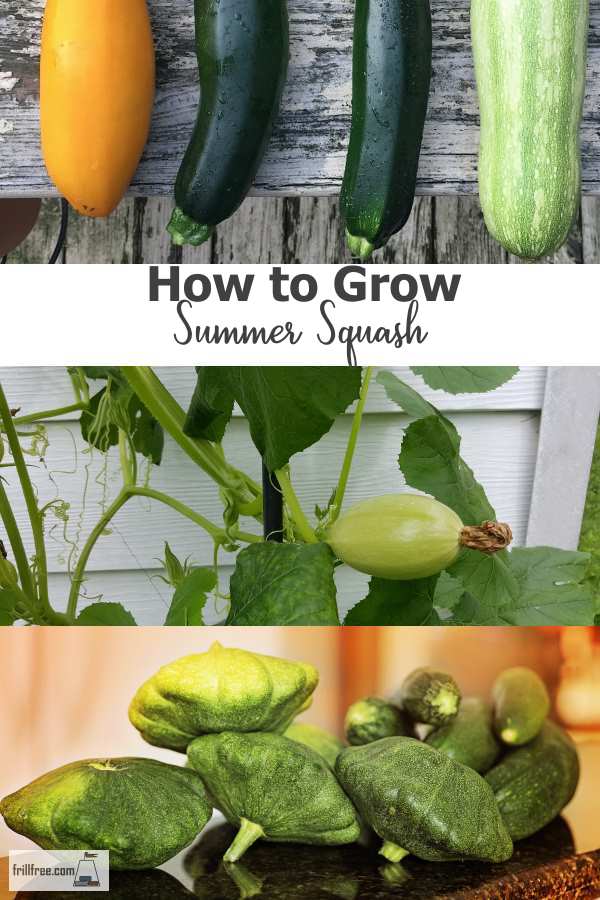- Homesteading
- Growing Vegetables
- How to Grow Summer Squash
How to Grow Summer Squash
Patty Pan, Zucchini and more
Learning how to grow summer squash is a steep learning curve - it's taken me a long time to figure out the exact right conditions for the tenderest and happiest patty pan, zucchini and other summer squashes.
These types of squash are also known as courgettes in many places in Europe. The Italians have grown them as Zucchini for centuries, and use them in many pasta dishes.
They are delicious simply chopped up and sauteed in olive oil with a few fresh herbs, and freshly grated parmesan cheese.
Whether you pick them as tiny finger length sweet goodness, or wait for them to reach meaty maturity for baking in zucchini bread, these are always highly anticipated in many gardens.
So what do summer squash need to grow successfully? These plants are known as heavy feeders, meaning they like a rich soil with compost, aged horse manure or other nutritious soil.
I've grown them on compost piles which have partially aged, and they finish the summer by completing the aging process. The additional water that these plants need to form those mouthwatering fruits helps the compost finish working, and it's ready to spread in the fall after the summer squash have done their duty.
They also like the occasional boost of compost tea which helps keep the momentum going.
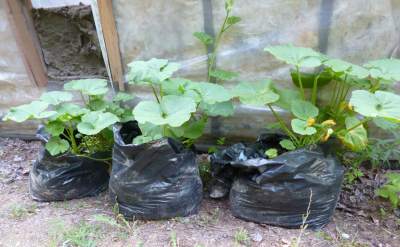 They also like growing in plastic bags filled with compost
They also like growing in plastic bags filled with compostThese plants can't take any frost, so it's pointless starting them too early in the season.
Wait until June to plant the large flat seeds, and they'll quickly catch up. They resent their roots being disturbed, so plant a living mulch around them, or mulch with hay or leaves to keep the moisture in the soil from evaporating.
They love the heat, and won't do much until the days of August with warm nights boosts their growth and in some cases you can almost see them grow. Most varieties that are available now have been bred to be a little less assertive in their growth, and come in bush form, rather than in a vine type.
So, you've planted three seeds per hill just as the instructions say, watered them in well, and they're growing like gangbusters. Now they start to bloom, but you're wondering why you're not seeing any of those delicious fruit.
Squash of all kinds have two types of flowers; male and female. What you'll see first of all is a whole lot of male flowers, as they prepare for the arrival of the first shy females at the dance.
You can see the difference in the pictures:
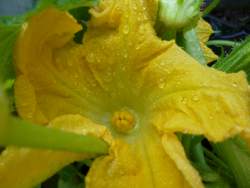 Female Squash Blossom
Female Squash Blossom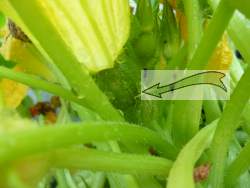 The fruit forms below the flower
The fruit forms below the flower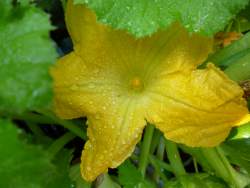 Male Squash Flower with Anthers
Male Squash Flower with Anthers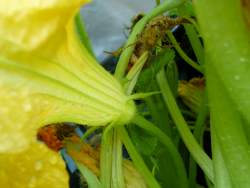 No Fruit below the Flower
No Fruit below the FlowerOnce the flowers are pollinated by insects, the fruit will start to form. It only takes a few days to get big enough to make a nice addition to your salad or stir fry.
The leaves like the full sun, but the fruit tend to hide beneath them, so check under the prickly leaves so you don't end up with giant zucchini - all types are best picked small and often.
Lots of high end restaurants prize the blossoms themselves for coating with batter and a quick immersion in hot oil for a gourmet treat.
